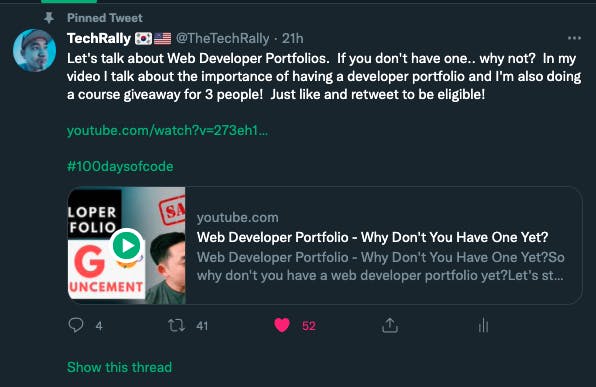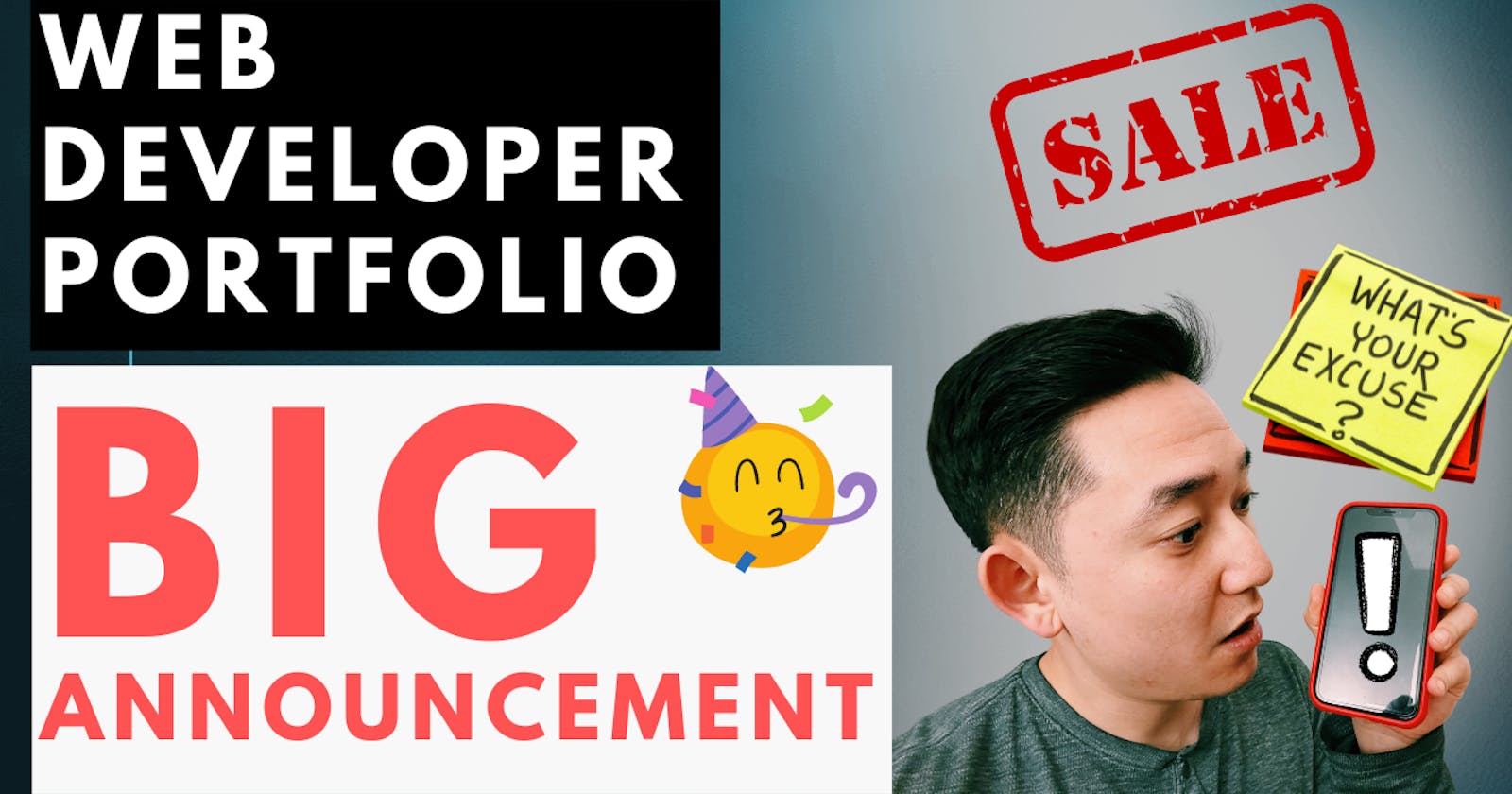Web Developer Portfolio - Why Don't You Have One Yet?
Why Every Web Developer needs to have on a portfolio to land their first job in Tech
You can watch the full video here - https://www.youtube.com/watch?v=273eh1zyGu8
I want to talk to you about why it's so important to have a web developer portfolio, especially if you're self-taught or coming from a non-traditional background. Let's get into it. Although the tech industry has become more flexible about hiring developers without a computer science degree, the reality is that having a degree just helps a lot more in terms of job prospects.
And why is that?
Having a degree is a social proof that many companies recognize as a sign that this person has studied programming for four years, this person should be able to just transition into the workplace right away. But does that mean that we all need to have computer science degrees? Is Freecodecamp useless? No, not at all. That's really far from the case. It's not me bashing on colleges, but there are alternative ways for you to get into this industry that just aren't easy. So many people are trying to learn how to code and trying to get a company to take a chance on them is going to be very difficult. So what they need to do is more than just learn how to code, they need to be different. There are so many categories I want to touch on, but in this blog, I want to be specific with the web developer portfolio.
So, what is a developer's portfolio? A portfolio website is a single source of truth, or I like to call it a marketplace for you to showcase your skills as a developer. Are you writing code and showing it on your portfolio? No, not necessarily. But to me, your profile and resume should explain who you are, what your skills are, and what kind of projects you've worked on. Your portfolio should be the one stop shop for all of this information to show people that you are a software developer and here's the proof. It's so important to have a portfolio these days because when you're reaching out to recruiters and hiring managers via direct messages, it's hard to expect these individuals to take a chance on you, especially when you don't have anything to share.
Rather than sending a message saying that you're learning web development, it's better to send something more meaningful and provide proof that you've done the work by sending a thoughtful message about yourself. You also want to emphasize how you can contribute and showcase your portfolio that includes projects. That will give you a significant advantage over those that studied on Udemy and don't have a portfolio or anything to show that they're a web developer.
What I notice is that people are going through this coding journey like a class, feeling like they need to learn everything from front-end frameworks to back-end frameworks before starting a portfolio.
Let me stop you right here.
You don't need to know the latest and greatest technologies to build a web developer portfolio. All you need is some basic understanding of HTML and CSS. I hear a lot of excuses like, "I don't have any projects to showcase, so why should I build a portfolio?" And I get it, that is a valid argument. But, to me, building a portfolio is an opportunity to practice my HTML and CSS skills. Once I build and deploy it, I don't really need to worry about it again. If you build new projects, all you need to do is update your static layout and add your projects. It's always good to be prepared once you do your level and have the projects that you want to showcase. Now you have that one place where you can market your skills as a software developer. The second thing I hear a lot is that you're not a legitimate developer if you don't build it from scratch.
Don't listen to those people.
There are two camps when it comes to building out a portfolio: one believes that you need to build everything from scratch, including CSS and animations. Another camp says, "Screw that." I'm just going to buy a bootstrap theme, interpret it, and read the code, understand the layout and CSS structure. And I'm going to make adjustments specific for my use case.
Can you guess which side I'm a big fan of? Obviously, it's the second one.
Working on iterating off of themes is the way to go, in my opinion. It's so much easier because you’re not reinventing the wheel. The reason I find this important is because it's all about time allocation. The time you spend on one thing is time taken away from another, and what I mean by that is you should really spend your time and energy building out your projects rather than really focusing on your portfolio. Building out the authentication system, the front end, and the back end will take a lot of time and focus. You need to make sure that your application is up to par with the standard of a junior developer. But if you spend all this time working on your portfolio, which is supposed to be a lightweight application, I really feel like you're just wasting your time. It's so crazy to me that building a portfolio is so recommended and not many people do it earlier. In their coding journey, you need to have a web developer folio, which is one of the most important requirements to help you stand out.
I want you to put yourself in the shoes of a recruiter or a hiring manager and if someone contacted you saying that they are a web developer looking for their first job and if they don't really have anything to back that up with, how can you really just trust them on their word?
You want to see the social proof, right? You want to see the portfolio right? You want to see the projects right?
At the end of the day, as a hiring manager or recruiter, you want to make sure that you are who you say you are because on LinkedIn, you don't have anything that says that I am a full-time web developer working at a company.
But again, I want to emphasize this. All you need is HTML and CSS to build a web developer portfolio. So, what is your excuse for not having a portfolio? It's just not tangible enough for a lot of people. They ask me, "so how do I actually make one?" It's not hard, but there are some basic steps for you to get started.
I know what the hardest part is. It's just getting started. So I'll start by making this announcement.
If you didn't know, I am currently making a practical portfolio course to help you jumpstart your career and really start marketing yourself as a software developer. You don't need to know any special frameworks to do this course. All we do is buy a framework, build our portfolio, and deploy it to production using HTML, CSS, and Netlify. We are going to interpret the code that already exists and customize it to our needs, and just really use it to showcase our personal skills and our projects. To be honest, I never wanted to be a course creator.
There are so many good people already out there, but as a YouTube influencer, I want to give you more tangible things to reference so that the advice I'm giving is not just going into deaf ears. Obviously, you need a web developer portfolio but how do I actually do it? You're not really showing me how to do it. So for those of you that are complaining about that, I took the time to work on this course specifically for you guys.
Right now, the course is in pre-sale and $19.99. Once I'm finished building it out, I'm going to increase the price to $24.99.
Link to the Portfolio Course here - bit.ly/tr-portfolio-sq
It's really up to you if you want to get it now or if you want to get it later, but I can guarantee you that the course price will increase. Like I said before, I want to give my community more tangible results from watching my content, and not just me talking about how I became a web developer so you can be one too. A portfolio site that I'm working on with you won't be revolutionary by any means, but I truly believe that it can be a catalyst for you to start getting your foot in the door. Eventually, when you finish this course, I want you to feel confident and not scared about reading a larger codebase, making code changes, deploying an application to production, and even buying the domain.
Honestly, I'm just tired. Tired of making content that sounds motivational, but doesn't really provide actionable tasks. This portfolio course is something I truly believe in, and I think it can make a huge impact for you. I'm not a natural salesman, and I never really wanted to make courses, but I've seen a gap. And unfortunately, I can't help myself but to try to fill it and if it just helps you guys out then I'm more than willing to try it. So I hope that this course can be something that will help you to feel confident that you've accomplished something, that you've built something on your own, and let's just keep moving forward.
If you've made it this far, thank you so much for reading about my web developer portfolio and about my courses. I want to show my appreciation for everyone who is part of this community. Why not do a course giveaway and specifically I'm going to do a course giveaway for three people?
All you need to do is like my tweet or retweet it and I'll provide the link to the tweet below.
https://twitter.com/TheTechRally/status/1458117914142334977

I really believe that after reading this article, every person should have a web developer portfolio. No excuses. You don't need to know five different languages. I've been in this industry for six years and nothing beats the fundamentals.
So use those fundamentals to build a portfolio with me. Let's do this and get your portfolio up and running as soon as possible. If you have any questions, I do have a Discord community that is relatively active, so feel free to join that one, too. If you do sign up, I also have a channel dedicated to open discussions about this course. So developers, join me, and let's build that portfolio.
For the rest of you, stay patient, your time will come.
